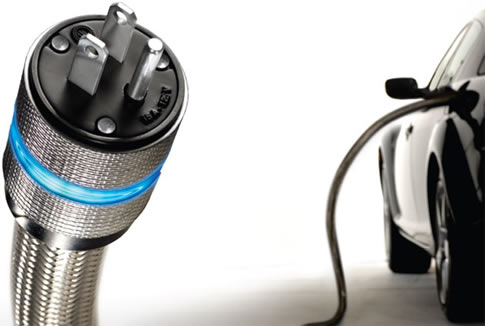
The indirect environmental impacts of electric cars from production mean that electric vehicles can be just as unsustainable as conventional diesel or gasoline vehicles. Source: RideLust.
The words “electric car” are normally associated with being a sustainable vehicle choice. However, according to a study conducted by the Norwegian University of Science and Technology, electric cars (EVs) may not necessarily be better for the environment.
The main difference in the environmental impact of EVs and conventional vehicles is due to the different production inputs and methods for making batteries and motors for EVs. The human toxicity potential of electric vehicles is around 200% greater than that of conventional cars due to sulfidic tailings created when processing copper and nickel (Hawkins et al. 6). These metals also cause a stronger acidification impact (BBC). Another issue to consider is where the electricity to charge the car’s battery comes from: if electricity is provided by coal, oil, or lignite combustion, the environmental benefits from using an EV are outweighed (Hawkins et al. 9). For instance, when powered by coal electricity, EVs increase the global warming potential by 17-27% in comparison to using conventional vehicles (Hawkins et al. 4).
Consumers should be made aware of the actual impacts of EVs on the environment, so they can make more sustainable choices when searching for an environmentally responsible car. Electric car companies have established a clear word association in consumers’ minds between electric cars and sustainability, without acknowledging that in order to be sustainable, we must take into account where our electricity comes from, and how the production of these cars impacts the environment.
Works Cited
BBC. “Electric cars ‘pose environmental threat.’” BBC News. BBC News, 4 October 2012. Web. 7 October 2012.
Hawkins, Troy R., Bhawna Singh, Guillaume Majeau-Bettez, and Anders Hammer Strømman. “Comparative Environmental Life Cycle Assessment of Conventional and Electric Vehicles.” Journal of Industrial Ecology 16.5 (2012): 665-773. Web. 7 October 2012.
RideLust. “e-mobility Berlin: The German Electric Car Infrastructure.” RideLust. SeaWaves & Brains. 8 September 2008. Web. 7 October 2012.

The Norwegian “study” has been eviscerated at the following link:
http://tinyurl.com/9s9auuy
The “study” assumed that the Nissan Leaf uses an electric motor 20 times bigger than it actually does, and that the Leaf’s electric inverter is six times its actual size. Therefore, the manufacturing materials side of the analysis, which was key to its conclusions, is grossly erroneous.
Also, see my comment attached on the site that debunked the Norwegian “study”: When it came to the comparison of electric fuel vs. gas or diesel fuel, the study neglected to mention that the production of each gallon of gasoline requires 5 kW of electricity from outside of the refining feedstock. This amounts to roughly half of the electricity an electric car uses to charge its batteries.
Finally, there is significant evidence that the people and institutions that conducted the “study” have deep ties to Norway’s oil industry.
Bottom line: The Norwegian study is garbage.
cool thanks for that debunking bro , i’ve been surfing around doing research on this matter for a couple days , and so far i’ve yet to find an explanation in any way that the production of an electric car is any more harmful to the environment than the current gasoline powered cars are
except for the 1 specific aspect that i’ve been looking for , which is the batteries that would be made to power these cars , a couple days ago i was trying to get some signatures to show support of opposition to the pipeline and oil tankers that are trying to establish themselves on the pacific coast of canada here , and the person that i was talking to was against the idea and when discussing about the uses of said oil for cars he made the claim that the production of the batter for an ev is far more detrimental to the environment than any current gasoline powered car , due to the destruction caused by the mining of the materials to make the batteries , of zinc and nickel i believe were the 2 names he gave , so i’ve been trying to look up information on batteries to see if that claim is accurate or not , so far i haven’t found any relevant information , do you or anybody else here have an idea about this topic?…….
Hi there,
First of all, thanks to both of you for commenting on my post! I had no idea where the funding for the Norwegian study came from, I trusted that BBC would cite reliable sources in its news articles.
Just to clarify, I’m not suggesting that gasoline powered cars are great for the environment, however, I believe that it is important to take into account where the energy is coming from to power the car. In places like British Columbia, where 95% of energy comes from hydro power, electric cars are definitely a good substitute for less environmentally friendly conventional cars. But in cases like China, where a significant source of energy is from coal, is an electric vehicle really worthwhile?
As for the impact of battery production on the environment, metal mining in general is not usually conducted in an environmentally sound manner, although I have been unable to find any in-depth studies on this topic. You brought up a really important question. If I find anything, I’ll be sure to let you know.